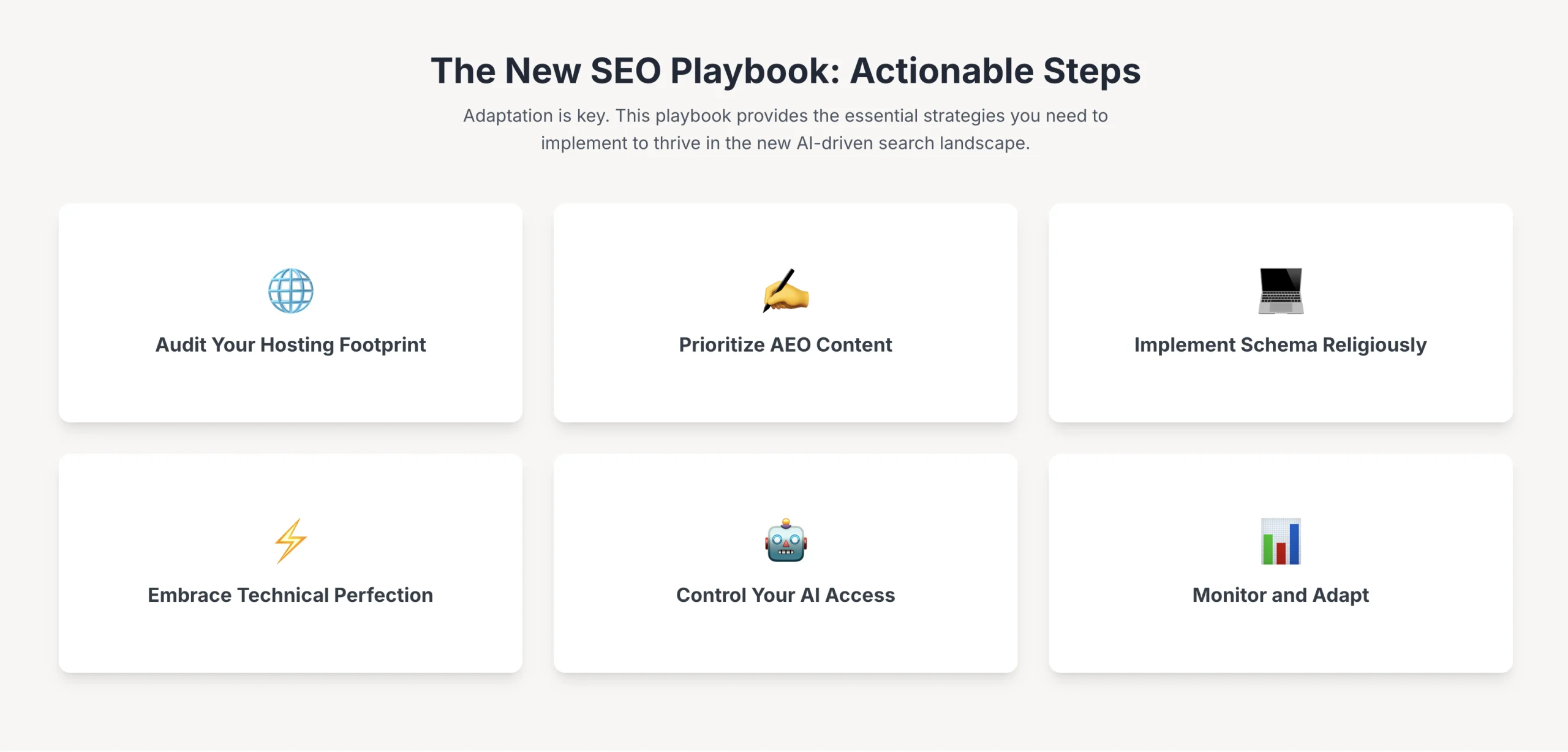Table of Contents
- Listen to Podcast
- The Seismic Shift in Search: Why Clicks Aren't The Whole Story Anymore
- The Unseen Foundation: Why Diverse IP Networks are More Critical Than Ever
- Optimizing for AEO: Speaking AI's Language (and Ensuring it Listens)
- An Experiment in AI Citation vs. Traditional Ranking
- The Cloudflare Conundrum: Taking Control of Your AI Footprint
- The E-E-A-T Imperative: How Hosting Reinforces Expertise
- Practical Steps for Your New SEO Playbook:
- FAQ
Listen to Podcast
The Seismic Shift in Search: Why Clicks Aren’t The Whole Story Anymore
You’ve probably felt that familiar mix of awe and unease watching Google’s AI Overviews (AIOs) expand their reach. It’s cool and all, seeing instant, summarized answers right there in the search results. But that’s just it, isn’t it? As an SEO professional, your gut might be tightening a little, wondering, “What about my clicks? What about my traffic?“
The truth is, we’re witnessing a fundamental reshaping of how users interact with search engines, and consequently, how we need to define SEO success. For years, the mantra has been “get to the top of page one for the clicks.”
And don’t get me wrong, that’s still valuable. But when Google’s AI delivers an instant, seemingly perfect answer, a user might never even click through to your site. This isn’t just speculation; recent studies and observations from industry giants have shown a tangible impact.
Data suggests that AI Overviews can lead to a significant drop in organic click-through rates, with some reports indicating reductions anywhere from 18% to over 60% depending on the query type.
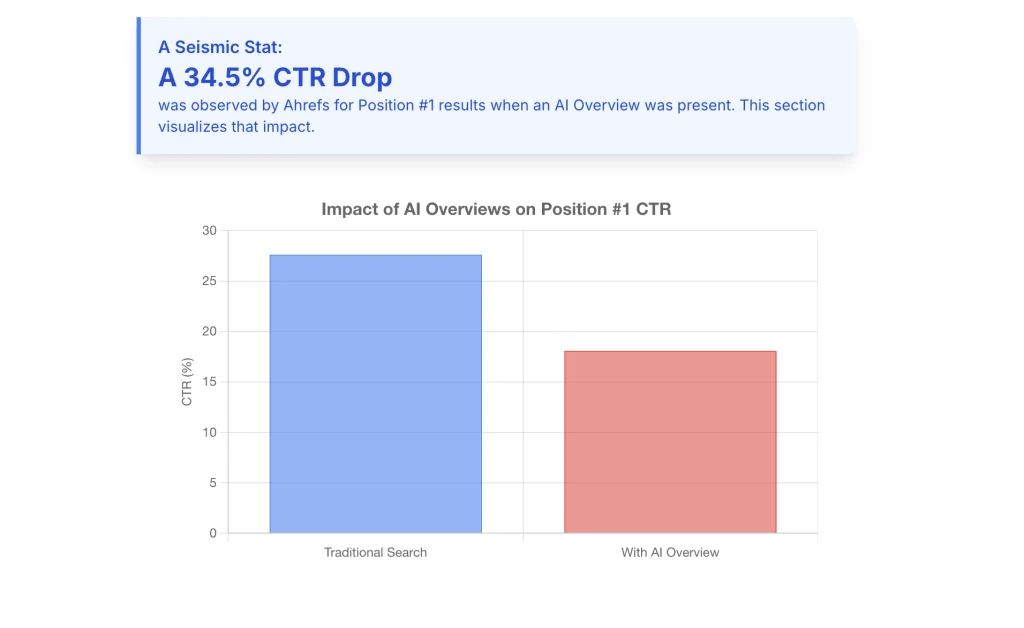
For instance,
Ahrefs recently observed a 34.5% CTR drop for Position 1 when AI Overviews were present across 300,000 keywords they analyzed. You can read more about these fascinating findings on Adapt Worldwide’s recent report.
So, if clicks are dwindling for certain queries, does that mean SEO is dead? Good luck getting anywhere with that defeatist attitude. Absolutely not. It means the goalpost has moved. We’re transitioning from a “click economy” to a “citation economy.”
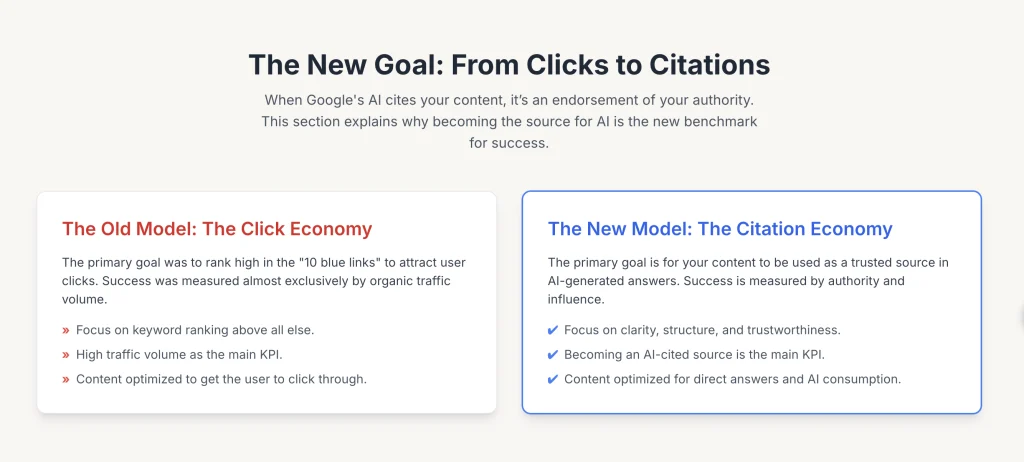
The new objective is to have your content recognized, summarized, and cited by Google’s AI as the authoritative source.
Let me explain. When Google’s AI pulls information from your site to form an AI Overview, it’s essentially giving your content a stamp of approval, an implicit endorsement of its quality and relevance. T
his subtle shift demands a complete re-evaluation of your SEO playbook, from content creation to, crucially, your underlying hosting infrastructure.
The Unseen Foundation: Why Diverse IP Networks are More Critical Than Ever
When we talk about the “new SEO playbook,” we’re not just talking about keywords and content. The very bedrock of your online presence—your hosting—plays a more vital, albeit often overlooked, role in an AI-dominated search world.
Specifically, the diversity of your IP addresses isn’t just a niche concern for advanced SEOs anymore; it’s a fundamental aspect of establishing true authority and trustworthiness in the eyes of Google’s increasingly sophisticated AI.
Think about it this way: Google’s AI is designed to understand context, relationships, and credibility at a scale previously unimaginable. If a network of sites, even those not explicitly part of a “private blog network” (PBN) but perhaps supporting content hubs or local satellite sites, all reside on the same or highly similar IP ranges, what does that signal to a hyper-intelligent algorithm? It could signal a lack of independence, a centralized control that contradicts the natural web.
The truth is,
for years, we at SEOHost.net have championed the power of truly diverse IP addresses – not just Class C, but A and B block diversity too. As we’ve detailed in previous The SEO Hosting Implications You Can’t Ignore discussions on the importance of unique IP hosting for SEO, this isn’t about gaming the system; it’s about mirroring the organic chaos and genuine decentralization of the real internet.
Hosting your sites across a wide array of geographically dispersed and independently owned IP blocks naturally establishes them as distinct entities.
This “no footprint” approach isn’t just for PBNs trying to fly under the radar; it’s about establishing genuine digital autonomy for any site within your ecosystem.
For instance, consider a scenario where you have your main “money site” and several high-quality, niche-specific blogs that naturally link to it, perhaps providing detailed product reviews or industry insights.
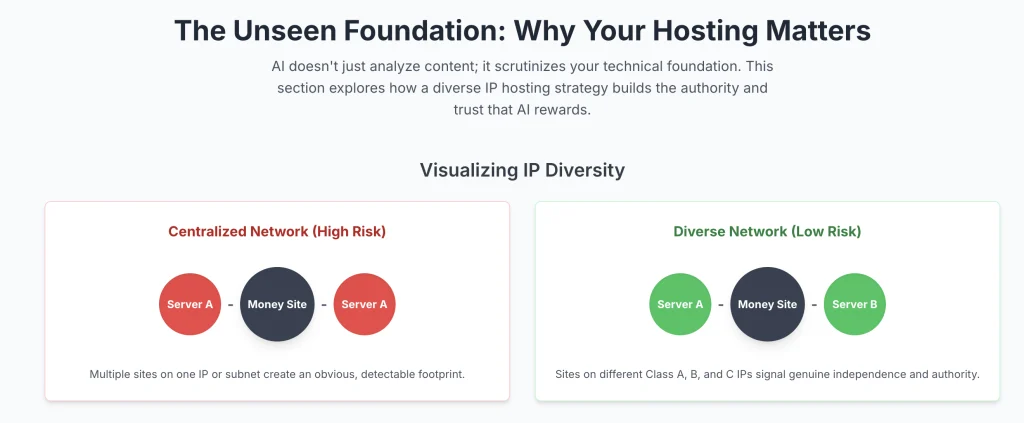
If all these supporting blogs share the same hosting environment and IP subnet, Google’s AI can quickly identify them as part of a single, controlled network.
While this might not lead to an immediate penalty, it absolutely limits the perceived value of those backlinks and the overall authority your ecosystem could otherwise convey.
By strategically leveraging Class C SEO hosting that ensures genuine IP diversity, each supporting site stands on its own digital feet, making its contributions to your main site’s authority far more potent.
Optimizing for AEO: Speaking AI’s Language (and Ensuring it Listens)
If AI citation is the new gold standard, how do we craft content that speaks directly to these intelligent algorithms? This is where Answer-Engine Optimization (AEO) comes into play. It’s about clarity, conciseness, and structured data, all underpinned by a reliable, AI-accessible hosting environment.
First, clarity and conciseness are paramount. AI Overviews thrive on direct answers. Your content should get straight to the point, answering potential queries explicitly and succinctly. Think about how-to guides, detailed FAQs, and definitive statements. Don’t bury the lead in fluff; make it easy for AI to extract the core information.
Second, structure is king. AI loves structured data. This means more than just H1s and H2s. Embrace schema markup to explicitly tell search engines what your content is about.
Using Schema.org vocabulary for things like “HowTo,” “FAQPage,” “Product,” “Review,” or “Article” can significantly increase the chances of your content being understood and cited by AI. As we’ve often emphasized in our resources on technical SEO best practices, good technical hygiene makes your site easier for all crawlers – human or AI – to process.
Third, and this is where hosting re-enters the conversation, your site needs to be technically pristine and readily available. If your server is slow, goes down often, or is bogged down by a “bad neighborhood” of other sites on shared IPs, good luck getting anywhere with AI citation.
AI crawlers, much like human users, appreciate speed and reliability. A blazingly fast WordPress SEO hosting setup, supported by dedicated resources and diverse IPs, ensures your content is not just accessible, but inviting to the algorithms.
An Experiment in AI Citation vs. Traditional Ranking
To truly grasp this shift, let’s consider a hypothetical experiment. Imagine two identical, high-quality articles on “the best way to prune roses.”
- Article A: Hosted on a shared IP with hundreds of other unrelated sites, slow loading times, minimal schema markup. It manages to rank #7 in traditional organic results.
- Article B: Hosted on a dedicated IP from a diverse Class B network, lightning-fast, rich with “HowTo” schema, clear headings, and concise steps. It ranks #12 in traditional organic results.
In the past, Article A would likely get more clicks due to its higher organic position. But in the AI Overview era, our hypothesis (supported by emerging trends) suggests Article B might be far more likely to be cited by Google’s AI for an “AI Overview” summary on “how to prune roses.” Why?
Because its technical foundation and structured content make it eminently consumable for AI, even if it’s not a traditional “top 10” organic result. This hypothesis is supported by new data showing that AI Overviews are less likely to cite pages ranking in Google’s traditional top 10 positions following the March 2025 core update, opening the door for well-structured, authoritative content outside those top spots. You can delve deeper into this interesting trend on Search Engine Land.
This isn’t just about PBNs anymore; it’s about giving all your content the best possible chance to be understood and valued by AI. It’s about building trust at a foundational level.
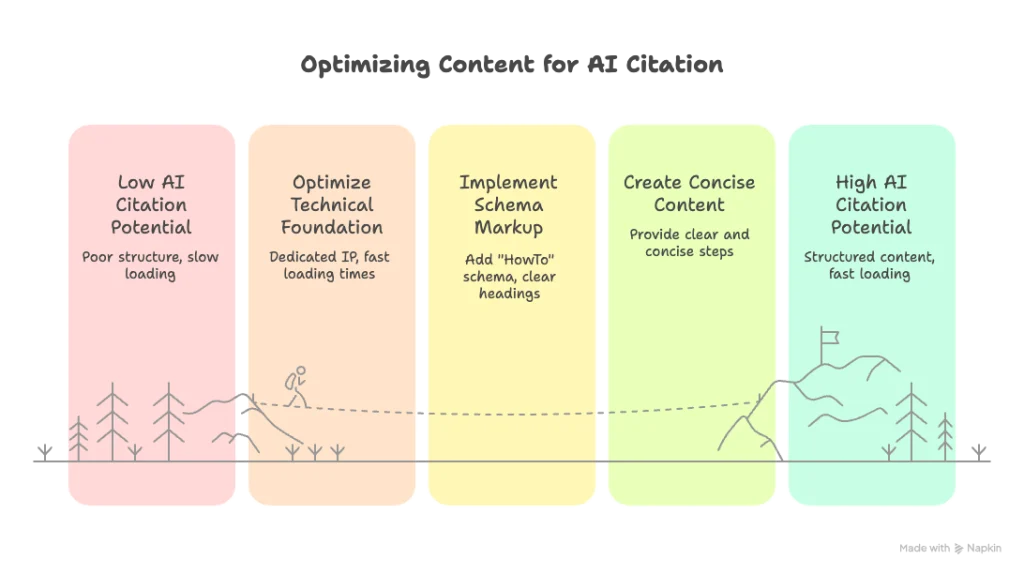
The Cloudflare Conundrum: Taking Control of Your AI Footprint
Speaking of trust and control, a significant development in the past couple of weeks has been Cloudflare’s new policy regarding AI crawlers. As of July 1, 2025, Cloudflare now requires explicit permission from websites for AI companies to scrape their content. Moreover, new domains using Cloudflare will default to denying AI crawlers access. This is huge.
The truth is, this highlights a growing concern about content ownership and AI model training. Blocking AI crawlers via CDN can inadvertently limit your content’s AI Overview citations. The tension: protect your content, or enable AI visibility?
This is where your choice of SEO hosting becomes an empowering strategic decision. When you’re leveraging a provider like SEOHost.net, which focuses on providing truly independent hosting environments with diverse IPs, you maintain more granular control.
You’re not beholden to broad, default CDN policies for your core accessibility. You have the flexibility to decide which bots (human or AI) access your content, from where, and how. This level of autonomy is crucial in navigating a landscape where AI’s data appetite clashes with content creators’ desire for control and proper attribution. Cloudflare’s official press release details this permission-based approach.
The E-E-A-T Imperative: How Hosting Reinforces Expertise

In the age of AI, Google’s E-E-A-T guidelines (Experience, Expertise, Authoritativeness, and Trustworthiness) are more important than ever. AI models are trained on vast datasets, and they learn to distinguish credible sources from questionable ones. Your SEO hosting plays a subtle yet significant role in reinforcing these signals.
- Trustworthiness: A site hosted on a reliable server with a clean IP history, robust security (like free SSL certificates and DDoS protection, which we prioritize at SEOHost.net), and consistent uptime inherently signals trustworthiness. A site that frequently goes down, loads slowly, or shares an IP with known spam sites will immediately raise red flags for AI, just as it would for a human. Google’s own documentation on creating helpful, reliable, people-first content emphasizes these very principles.
- Authority: When your sites (including any PBNs you might operate) are perceived as truly independent entities, each with its own “digital address” via diverse IPs, they collectively contribute more authentic authority to your money site. It looks like a natural endorsement from multiple, distinct sources, not just a centralized, controlled network. Match your awe and unease about AI’s power with awe for its deep analytical connections – and how well-structured hosting can positively influence them.
Let me explain this through a lens of pragmatic skepticism:
Google’s AI, with its vast analytical capabilities, isn’t just looking at content; it’s looking at patterns. If all your sites, even well-written ones, share a single digital footprint, the AI might downgrade their collective authority, seeing them as less independent and thus less trustworthy.
But by distributing them across different SEO hosting USA servers with diverse IPs, you’re essentially telling the AI: “These are distinct, valuable sources, each with its own unique digital identity.”
And let’s not forget the broader role of AI in hosting itself. Beyond just AI Overviews, AI is being leveraged for backend server optimization, predictive maintenance, and cybersecurity. For instance, over 80% of businesses in Europe are projected to integrate AI-powered software into their hosting stack by 2026 to optimize expenses and performance. A recent Hostopia article highlights how AI is transforming web hosting. This means the very infrastructure supporting your site is getting smarter, and you need a provider that understands and implements these advancements.
Practical Steps for Your New SEO Playbook:
So, what does all this mean for your day-to-day SEO strategy? It means integrating your hosting choices directly into your content and overall digital strategy.
- Audit Your Hosting Footprint: Are all your supporting sites, satellite blogs, or PBNs clustered on the same handful of IPs? If so, it’s time to diversify. Look for providers that genuinely offer Class A, B, and C IP diversity. Good luck getting anywhere with old, outdated hosting strategies.
- Prioritize AEO for All Content: Every piece of content should be crafted with AI in mind. Focus on clear, concise answers to user queries. Use bullet points, numbered lists, and comprehensive FAQs. Don’t get me wrong, long-form content is still valuable, but ensure the core answers are easily extractable.
- Implement Schema Markup Religiously: This is AI’s Rosetta Stone. Use structured data to explicitly define what your content is about. Tools are cool and all, but if your content isn’t properly marked up, you’re missing a massive opportunity for AI citation.
- Embrace Technical Perfection: Page speed, mobile-friendliness, secure HTTPS, and robust uptime are non-negotiable. Your hosting choice directly impacts all of these. A slow, insecure site isn’t just bad for users; it’s a red flag for AI.
- Control Your AI Access: Be aware of how CDNs and other third-party services manage AI crawler access. Understand your options and make informed decisions that align with your strategy for AI citation.
- Continuous Monitoring and Adaptation: The AI landscape is changing rapidly. What’s true today might evolve tomorrow. Stay engaged, monitor your analytics for changes in AIO appearance, and be prepared to adapt your content and hosting strategies.
As Google continues to refine its AI content guidelines (which emphasize helpful, reliable, people-first content and warn against using AI solely for manipulation), your proactive approach becomes key. You can always refer to Google Search Central’s guidance on using generative AI content for the latest insights.
The truth is, the new SEO playbook isn’t just about tweaking keywords; it’s about building a robust, resilient, and AI-intelligible online presence from the ground up. And that, my friend, starts with smart, diverse IP SEO hosting.
It’s time to stop chasing fleeting clicks and start building lasting authority that even Google’s most advanced AI will recognize and cite. Empower yourself, question the status quo, and ensure your digital foundation is as future-proof as your ambitions.
FAQ
Frequently Asked Questions
AI Citation is when your content is referenced or quoted by tools like Google’s AI Overviews or ChatGPT. It’s valuable because it boosts brand trust and discoverability—even without a traditional click-through.
Hosting your sites on diverse Class A, B, or C IPs helps search engines and AI models recognize them as independently authoritative. This separation improves your chances of multiple AI citations across properties.
AEO is the process of structuring content—using schema, FAQs, and concise summaries—so it’s easy for AI tools to understand, extract, and cite. It increases the chance of your site being featured in zero-click answers.
Cloudflare blocks AI crawlers like ChatGPT and Gemini by default unless you adjust your bot settings. This can unintentionally prevent your content from being indexed or cited by generative AI platforms.
Hosting with high uptime, fast page load speeds, and clear technical hygiene (e.g., clean headers, proper redirects, no spammy footprints) boosts credibility and trust—key signals in AI-driven ranking models.

